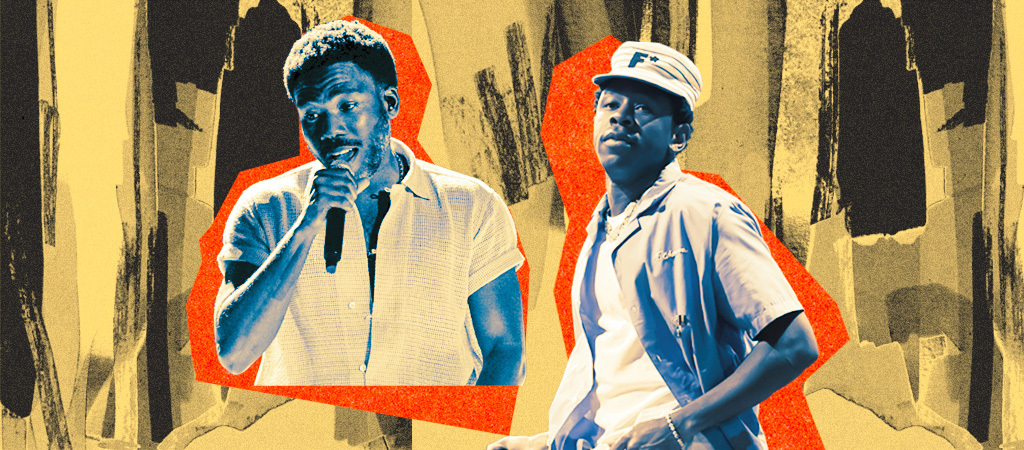During last night’s BET Awards ceremony, Donald Glover — who was there to present the award for Album Of The Year — took a bit of a digression during his time onstage to call out the show for never nominating him. Indeed, it’s one of the first times the network has even acknowledged Glover’s existence, and the fact he was also allowed to plug his quirky new film Bando Stone And The New World is probably a testament to the concessions BET’s programmers had to make to soothe his bruised ego over the years of neglect.
“This isn’t personal, but I just feel like I should have more BET awards,” Glover said. “I’m serious. It’s the Black Entertainment Television Awards. How much more entertaining do I have to do? Because it’s just the math of the fact. It doesn’t really make sense. I have more Grammys than Will Smith, which makes no sense, but I have the same amount of BET awards as Sam Smith.” Smith and Glover both have one BET Award each; Glover won Best Music Video in 2019 for “This is America”, while Smith won the 2015 award for Best New Artist. I don’t know if you noticed, but Sam Smith… also isn’t Black.
Glover joked that he’d be willing to remake BET Saturday afternoon mainstay Baby Boy if it would get him more recognition from the network. “I’ll have Jonathan Majors put me in a headlock, shave my head, I’ll do it,” he said, referring to a scene in which Ving Rhames puts Tyrese Gibson in a headlock during a heated domestic dispute in the film.
A modern funk album and a Gangsta Grillz mixtape? https://t.co/xsQp850hay pic.twitter.com/xpQkuXGb3o
— Well guess what, I’m CP (@TopherPatt) July 1, 2024
Social media users on Twitter noted that Glover has kind of a point — he should not have the same number of BET Awards nominations as Sam Smith, regardless of whether he and Will Smith have the same amount of Grammys — and drew parallels to another recent addition to the BET canon, Tyler The Creator. The Hawthorne, California native also went unacknowledged by the network until 2021, when he was honored with a (the admittedly vaguely titled) Rock The Bells Cultural Influence Award. During an interview about the award, he, too, acknowledged that he felt he “wasn’t accepted by that audience,” but that he held a deep reverence for the network growing up.
“I was so hype to perform at the BET Awards,” Tyler admitted. “I just never felt like my style of music would ever have been, not even appreciated, but allowed on there. And because of that, I would mock it. It was like a defense mechanism because I felt like I wasn’t accepted by that audience. But when they asked me this year, man, I was enthralled. I was so happy.” At first glance, it does appear that artists like Glover and Tyler contrast starkly from the usual BET fare. When they were both in the target demographic for BET’s old video countdown show, 106 & Park, they likely didn’t see themselves reflected in the usual rotation of artists like Soulja Boy, 50 Cent, or Hurricane Chris.
The way BET has left him and Tyler out of most of the convos for such a long time is crazy. https://t.co/319hUs11UC
— Well guess what, I’m CP (@TopherPatt) July 1, 2024
But over the years, they’ve each garnered mainstream acclaim for their creative works, which have always celebrated their Blackness and drawn extensively from deep cultural roots — even if they didn’t reflect the stereotypical looks and concerns promoted by not just BET, but mainstream depictions of Blackness in media in general.
Glover’s groundbreaking work in music and television includes the funk-soul revival album Awaken, My Love! and his paradigm-shifting dramedy Atlanta, which often addressed ongoing current events and made references to Black lifestyle deep cuts like the “haunted” Lake Rainier in his native Georgia. Meanwhile, Tyler’s multihyphenate takeover of hip-hop, fashion, and animation with albums like Igor, shows like The Jellies!, and his history-making collaboration with Pharrell Williams and Louis Vuitton, centered Blackness and posited a broader spectrum of possibilities for it. You can’t tell me you couldn’t see Carlton Banks decked out in Tyler’s preppy Louis pieces. There are all kinds of alternative expressions of Blackness, and neither artist allowed the fact they didn’t see those expressions on TV stop them from expressing themselves in full.
While it’s clear that BET’s definition of notable Black art is expanding — a net good for a network whose narrow typecasting of Black art has been criticized in the past — neither Glover nor Tyler should ever have fretted. They’ve been two of the most important Black artists of their generation all along. From the beginning, both artists have presented a dazzling, wide-ranging perspective of what Black art can be. Beyond BET, we would all benefit from recognizing those talents — and the talents of others who go against the grain — and letting Black art be more than what we’ve already seen.







